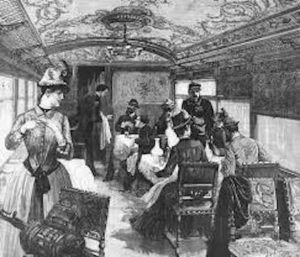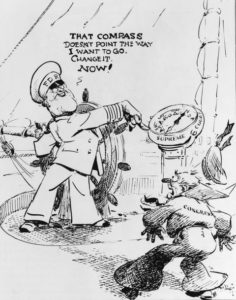Bits and Pieces
The Orient Express: Then and Now
Several summers ago, K and I took a train ride from Paris to Vienna. The goal was not to get to Vienna, but rather to experience the train ride itself. We were travelling, you see, on the Orient Express.
The Orient Express was the creation of a Belgian entrepreneur by the name of Georges Nagelmackers. In 1865, after seeing Pullman sleeping cars in the US, he got to work developing a luxury train that could travel from one end of Europe to the other. His dream was realized in 1889 when his Orient Express line (inaugurated in 1883) left the Gare de l’Est station in Paris on its first 1,700-mile journey all the way to Constantinople (modern-day Istanbul).
The opulent train became a commonplace feature of spy novels, vampiric tales, crime thrillers, and dozens of films and TV shows. In 1977, it was officially shut down, but it has reappeared several times. Today, you can take the Orient Express from Paris to Vienna, which is what we did.
The current version offers an elegant dining car, along with personal compartments equipped with upholstered seats, fold-out antique washbasins, and comfortable couchettes with fine linens. Another vintage touch: little fans instead of air conditioning.
This last authentic detail turned out to be an unpleasant lesson in historical reality. On our second day on the train, when the temperature rose to 90+ degrees and all the passengers had to remove their formal clothes – sometimes down to T-shirts – we were sweating like the common people! No, like wealthy people before AC!


Zoom Is Great… Until It Isn’t
I love Zoom. It allows me to communicate with colleagues all over the world and have face-to-face discussions at the spur of the moment. It also allows me to attend my regular twice-weekly group meetings with the principals of my main biz without the cost and inconvenience of flying.
In May, I dusted off my crystal ball and predicted which pandemic-propelled technologies would flourish after lockdowns ended. Zoom was one of them. Since then, the company has grown and grown. It will certainly slow down at some point, but I don’t see it losing market share. Unless…
There are two things Zoom needs to do to ensure its position as the leader in its field.
The first is the audio. Currently, the Zoom app doesn’t allow two people to speak at the same time. One or another gets cut off. This is NOT how in-person group conversations work. When two people speak at the same time in Zoom, there is that moment when they both realize what’s happened… and then an awkward few seconds until one says, “Go ahead. Speak.”
I’m sure Zoom will improve this small glitch, as hard as it is to imagine how they’ll do it. If they don’t, I suppose we’ll all have to get better at timing our interruptions.
The second gripe I have about Zoom is a personal one. It is not a threat to the company’s future growth… still, it bothers me. I’m talking of course about the fact that I am always disappointed in how I look on the screen. I mean, I don’t look as handsome as I believe myself to be. This is partly due to certain undeniable psychological issues, but it’s also due to the fact that the camera and the lighting in my office are not conducive to good photography.
I just found an article by Seth Goodwin, the productivity expert, that explains how he solved this problem. You can read it here.
A Good Bet: Self-Driving Cars
We are beyond the tipping point with self-driving vehicles. They are a current fact, and an inevitable future reality. I don’t mean some self-driving cars and trucks. I mean nothing but… and in the next 10 years.
Just recently, California signed SB570 into law. It says that cars no longer need to have mirrors, windshield wipers, and speedometers. GM is planning to invest another $27B through 2025 in self-driving vehicles… BMW, $35B… and Audi, $16B.
One analyst I know is projecting this will grow into a $7 trillion market by 2031, a growth rate of 63,000%.
I believe it.
Thanks, but No Thanks
In 1996, Murder Ballads, the Bad Seeds’ ninth album, was released. It garnered widespread critical praise, and its lead singer, Nick Cave, was nominated for an MTV award as Best Male Artist.
In response, Cave sent MTV the following letter:
21 OCT 96
To all those at MTV,
I would like to start by thanking you all for the support you have given me over recent years and I am both grateful and flattered by the nominations that I have received for best male artist. The air play given to both the Kylie Minogue and P. J. Harvey duets from my latest album Murder Ballads has not gone unnoticed and has been greatly appreciated. So again my sincere thanks.
Having said that, I feel that it’s necessary for me to request that my nomination for best male artist be withdrawn and furthermore any awards or nominations for such awards that may arise in later years be presented to those who feel more comfortable with the competitive nature of these award ceremonies.
I, myself, do not. I have always been of the opinion that my music is unique and individual and exists beyond the realms inhabited by those who would reduce things to mere measuring. I am in competition with no-one.
My relationship with my muse is a delicate one at the best of times and I feel that it is my duty to protect her from influences that may offend her fragile nature.
She comes to me with the gift of song and in return I treat her with the respect I feel she deserves – in this case this means not subjecting her to the indignities of judgement and competition. My muse is not a horse and I am in no horse race and if indeed she was, still I would not harness her to this tumbrel – this bloody cart of severed heads and glittering prizes. My muse may spook! May bolt! May abandon me completely!
So once again, to the people at MTV, I appreciate the zeal and energy that was put behind my last record, I truly do and say thank you and again I say thank you but no… no thank you.
Yours sincerely,
Nick Cave
(Source: Letters of Note)
Worth Quoting: Thoughts on the Danger of Indifference
* “All it takes for evil to flourish is for a few good men to be a little wrong and have a great deal of power, and for the vast majority of their fellow citizens to remain indifferent.” – William Sloane Coffin
* “After the first blush of sin comes its indifference.” – Henry David Thoreau
* “The opposite of love is not hate, it’s indifference. The opposite of beauty is not ugliness, it’s indifference. The opposite of faith is not heresy, it’s indifference. And the opposite of life is not death, but indifference.” – Elie Wiesel
Fun Fact
The town of Boring, Oregon (named after former resident William Boring) became the sister city of Dull, Scotland in 2012.
3 Words I’m Trying to Work Into My Conversations
* Treacle is a kind of molasses. It is thick, sticky, and sweet – which is why it has come to be used as a slang term for cloying sentimentality. Example: The book was ruined by all the treacle about his childhood.
* Cacoethes – from the Greek for “ill-disposed” – is an irresistible urge, especially for something harmful. Example: He quit years ago, but never overcame his cacoethes for smoking.
* Glabrous refers to a surface – e.g., skin or the leaves of plants – that is smooth and hairless. It was derived from the Latin for “bald.” Example: She lovingly caressed her grandfather’s glabrous scalp.”
How the Vanderbilts Lost Their Fortune
There are three things one can do about wealth: Build it. Preserve it. Or destroy it.
Financial planners will often remind you that most great family fortunes are entirely dissipated in three generations. The history of the Vanderbilts is a classic example Cornelius built it. His son Billy preserved it. And Billy’s children and grandchildren destroyed it. My friend JS recently sent me a clip on this. You can watch it here.
Readers Write…
Kudos for the November 8 issue:
“You Say You’re Proud to Be a Liberal, but You Don’t Act Like It!”
Mark,
Love your post today. It crystallized a few critical points that I forgot about amid all the other turmoil! – DS
Mark,
Everything you said in that piece today was put beautifully so even a child would understand it. I of course agree wholeheartedly and in fact (although it has not been as true as it was in the past) it is ONE Of the main reasons I quit my former socialist ideology…. Your readers may be interested to know that it was Newt Gingrich’s Republican majority House that passed the only balanced budget amendment in 1995 by a margin of 300-132. And when it went to the Senate it only missed by one vote… to get the 2/3 majority needed…. Imagine, if that had passed in 1995, where we would be as a TRUE great economic powerhouse. – CF
Mark,
Every time I read one of these uncommonly sensible columns, I want to send you a big, stinging High Five. I’d really like to share them with my colleagues…. However, I know I’m going to get pushback from [those at the top] because it conflicts with [their] progressive ideology…. – TJ
Any ideas about how I might go about this diplomatically?
My answer:
When I wrote Early to Rise from 2000 to 2010, my audience was mostly young entrepreneurs that trusted my experience and happily accepted my advice without question. When I wrote Creating Wealth from 2010 to 2020, my audience was mostly 30- and 40-year-olds that were happy to incorporate my wealth building strategies uncritically. So, for 20 years, I gave my advice much like a winning sports coach or martial arts master would speak to his students.
In writing my current blog (MarkFord.Net), my audience is composed mostly of people my own age – successful businesspeople and professionals that have as much life experience as I do, but whose political and social views differ from mine. And so I’ve tried to take a more considerate, respectful, and thoughtful approach to asserting my views. My desire is to encourage them to understand my perspective by staying away from the easy barbs and clichés I might use if I were preaching to the choir. My goal is to disrupt some of their assumptions without being condescending or demeaning. I’d rather nudge and budge than rake and break.







